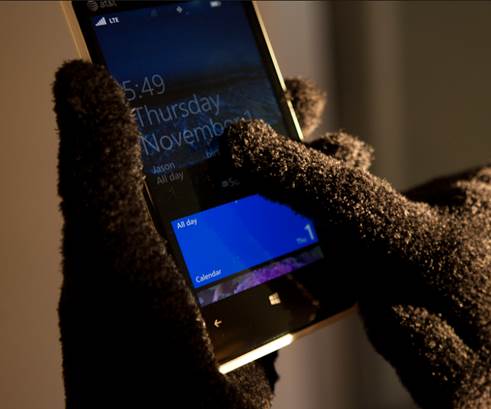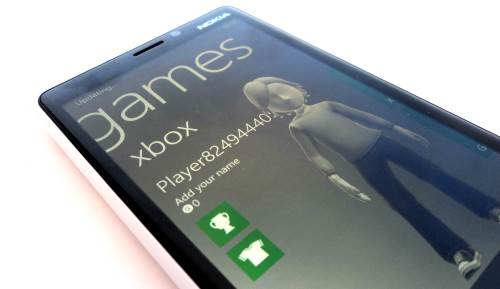Display
Lumia 920’s screen comes with so many new
stuffs from Nokia that they have to write a white paper introducing
specifically what is going on behind that curved glass – we linked to it at the
end of this review. The 4.5 inch IPS 1280x768 enhanced screen is named PureMotion
HD+, and whereas the 332ppi, which means Windows Phone 8, looks livelier and
performs images excellently, the new technology also improves the transition
response of the screen. While other typical IPS LCD screens have the average
level transition responses of 23ms, Lumia 920 wins this battle with the average
time of 9ms. Can you point out the difference in real life? We recognized the
blur reduction when poking the UI or moving the camera around. It is not sure
that the Lumia 920 would attract attentions immediately from the smartphone
fresh-users, but we cannot blame Nokia for trying to push the envelope.

Manipulation
on Lumia 920 with gloves
On the contrary, the outdoor performance of
Lumia 920 is really worth the price. While Lumia 900 performs so well outdoors,
the next Windows Phone 8 models is increased in contrast, brightness and color
composition, which means that images and websites would become considerably
clear and beautiful meanwhile, games and apps would be much easier to identified
under intense light. The ambient light sensor has also been enhanced, and we
recognize that the screen not only adjusts faster under the change of light but
also improves the color composition and contrast considerably to support
viewing depending on the environment that we are in. While November is not the
best time to check phone’s screen under the full sunlight, we did not encounter
any problem with the outdoor screen or under the harsh spotlight. However,
these winter months seemed to be ideal to view the Synaptics-powered capacitive
screen with gloves and the phone also performed well when it was first
introduced. The surface of the screen accepts even nails and some pens – which
we were not hesitate to test with when the screen was under the protection of
the Gorilla Glass coat.
Software
We will leave Windows Phone 8’s better
details to our in-depth review, but it should be pointed out how WP8 works on
the new Lumia. Live Tiles can help you customizing something to play with right
after opened and we still have new feelings, although they are a little
different from what we are familiar with Windows Phone 7. Talking about some of
the familiar software highlight, Nokia Maps is an excellent application and the
free turn-by-turn navigation is so admirable. Internet Explorer 10 is also
quite fast, and looks better on the quick-response PureDisplay screen of the
Lumia 920.
Live Tiles’ settings are easy to understand
and adjust as everything is well and logically organized. However, there are
still many problem; the long refresh time for social apps like Twitter and
Facebook, light Google integration (which is admittedly better than what
Microsoft offered in the past), and the conflict hole in choosing applications.
While Microsoft quickly claims that they are catching up, the new version (at
the time we write this review) is lack of Spotify, which was available in
Windows Phone 7, whereas things like Dropbox, Instagram and Flipboards are
still absent.

The
browser interface
The gaming selection, regardless of Xbox
live, can be messed up with many old games and does not give mobile gamers
enough to pull them away from the high delights of iOS and Android. The My Xbox
Live application is replaced by Xbox SmartGlass, handing you another way to
interact with your console. The full version requires Xbox Live subscriptions
(and a wide and strong enough bandwidth), and getting rid of some touchscreen
manipulation with controller buttons with a content browser. The integrated
SmartGlass content is linked with a specific icon, although unfortunately, not
all (especially Xbox Video) are directly transmitted.
We can connect to Netflix, but this
requires subscription. The content seems not to be added fully – maybe there
will be more content when the device is officially launched. While the keyboard
is available when you browse via phone, some of Xbox UI’s components still
require typing through UI and the controller. We want to see deeper integration
(maybe in games) when using Window Phones as Microsoft continues to implement
additional features because at the moment, there is nothing much for us to do
here. We will stick to the controller.

Xbox
interface
While our complaints about the ecosystems
still remain, Nokia keeps provides its own “hero” apps, and even improves some
of them in the process. Nokia Music continues to extent their library
regardless of the obvious competition. The application itself owns Dolby audio
supporter and a 7-channel built-in equalizer, while the gig finder feature is
now connected with location data to come up with the search results. The
application will even spin out navigation results and the ticket purchasing ability
for your chosen program as long as they are available. While anyone who signs
up to Spotify (or Pandora) maybe ignores this feature, Mix Radio still offers
many free music for transferring and downloading, with the ability to create any
offline playlist anywhere.
Unsurprisingly, Nokia includes many
photography apps and additional camera, from the enhanced practical City Lens,
whose capability is more than just leading us to the nearest coffee shop or a
bar across London, to GIF creation feature of Cinemagraph. However, the last
application does not seem to be ready to use widely. After filming a short
video, you can choose some areas of the picture to continue animating, while
the rest are paused. After that, this file can be share like a GIF file – well,
at least through a upload to SkyDrive
We cannot make our animated images sent via
email, Twitter or Facebook without letting the file automatically compressed
into JPEG. Finally, the SkyDrive option gives you the animation, even the
chance to interfere in your blog, but it turns out to be a convoluted workflow
for what should have been a small interesting addition. You will also need a
SkyDrive account just to look over the uploaded pictures. Yes, the cloud
storage of Microsoft, when installed in Windows Phone 8, is somehow not visual,
especially when talking about transferring pre-existing images to our phone. We
recognized that both web and mobile sides to the cloud storage system are unclear
and truly disappointing.